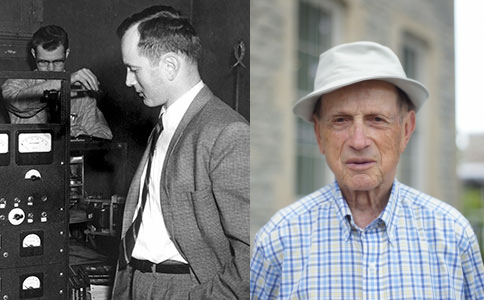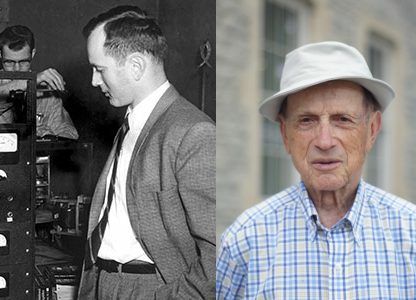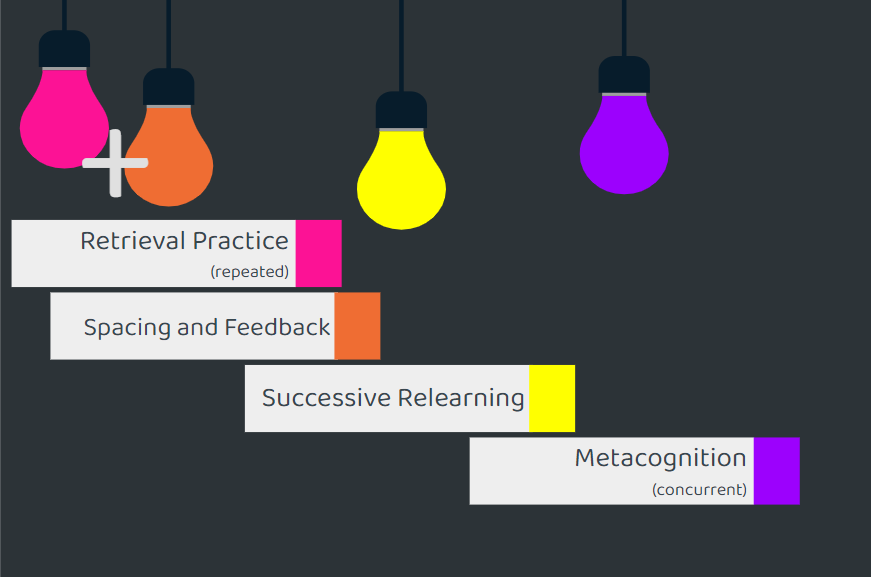When you read the research on test-enhanced learning you will eventually find yourself knocking at the door of successive relearning. Track back through the papers on successive relearning and you will eventually meet the brilliant research of Dr Harry Bahrick.
Dr Harry Bahrick
Narrowly avoiding serving in the Battle of the Bulge, Germany’s last major offensive campaign on the Western front, (December 1944), Bahrick found himself studying civil engineering at the University of West Virginia. With his life all-but spared by a test score and understanding the significance of this, he dedicated his life to learning and sharing knowledge with others. He made a profound contribution.
Getting into psychology
When World War II ended, Bahrick enrolled at the University of Maryland to study psychology so that he could investigate human nature as a scientist – and was hooked.
Bahrick, Ph.D., became interested in studying memory and went on to be one of the world’s foremost experts on very long-term memory. I make this point here because as teachers we tend to focus on more modest destinations – assessment or exams.
Memory is who we are, and once I realized that, I wanted to study how memories are formed, how they are retrieved, how they are stored, how they are lost.
Bahrick – https://www.owu.edu/news-media/details/a-most-memorable-accomplishment/
Pioneering programs and reinventing memory research
Bahrick was working on his dissertation at The Ohio State University when he got a job at Ohio Wesleyan in 1949. At Ohio Wesleyan University, Bahrick started the Memory Lab, publishing more than 70 articles on learning and memory.
The earlier distinction of “very long term memory,” is important as it required Bahrick to develop and pioneer new methods of investigating these long-term memories using statistical controls rather than experimental ones.
He was also very fond if undergraduate teaching too, he found it very rewarding and his educator credentials are evident in both his former student affirmations, their subsequent research achievements and the longevity of those relationships. Bahrick retired from teaching in 1990, but continued researching, retiring in 2006, remaining an emeritus member of the faculty. (I would later learn that one of those students is Dr John Dunlosky).
I find it the gratifying that some students credited me with influencing their life but that never became my conscious goal and developed friendships the students
Harry Bahrick APS Award Address
Recommending Harry Bahrick’s research
Our educational system is designed to impart knowledge, and the significance of this great effort depends on the degree of permanence of the effects that are achieved. Much of the information acquired in classrooms is lost soon after final examinations are taken, but beyond the general advice to practice and rehearse frequently, we have little to offer those who wish to minimize or prevent such losses.
Bahrick (1979: 279).
Dr Rawson’s research first introduced me to successive relearning and to Dr Harry Bahrick research. Bahrick’s explanations gain me a better understanding of the simple model of memory and two very distinct phases of learning and therefore the requirement of two distinct phases of teaching.
Bahrick takes the complex and explains it with simple brilliance. Let me share how his explanations helped frame my understanding.
Thus, maintenance of knowledge is assumed to reflect a two-phase process: an acquisition phase, during which information is forgotten between successive exposures and periodically reacquired, followed by a maintenance phase, during which no reacquisition is required, but (presumably) the information must be accessed or used periodically.
Bahrick (1979: 299)
Step 1
Acquisition of semipermanent knowledge typically involves repeated exposure to information, with losses of information during intervals between exposures.
Step 2
Continued maintenance of knowledge depends on periodic access.
Step 3
Most semipermanent knowledge is acquired over extended time periods during which actual practice is limited to relatively short sessions spaced at intervals. Thus much of what is learned during a first exposure is forgotten during the interval between exposures and must be relearned later to become a part of semipermanent knowledge.
Indefinite access to the acquired information remains highly probable if the retraining interval does not exceed the access interval. If the access interval is much longer than the retraining interval, much of the acquired information becomes inaccessible during the access interval.
Step 4
The total acquisition process as a cycle of acquisition, loss, and reacquisition of information, with diminishing amounts of information lost during the intervals between exposures until the information becomes part of permanent knowledge retrievable without further relearning.
For teaching
The distinction between the acquisition and the maintenance phase is meaningful only in relation to particular intervals between successive exposures during acquisition and to intervals between retrieval attempts during the maintenance phase.
That is – low storage strength or low retrieval strength, due to too few exposures or too long an interval and the knowledge is inaccessible (forgotten) and must be retaught.
Perhaps most critically for my teaching was Bahrick’s distinction of ‘a two-phase process.’ An acquisition phase and maintenance phase.
During acquisition I design learning with very low failure rates and a narrow focus. I am more deliberate about what I select to teach. I now teach less, and I actually expect the pupils to learn and remember less. When introducing new knowledge, I am even more selective, more reductive. As I told the SecEd (2022) podcast on memory, I never expect to teach something just once. In the maintenance phase, it expect a more. I use more oracy and timers to maintain a level of challenge.
If this post perks your interest – Maintenance of Knowledge: Questions About Memory We Forgot to Ask – Bahrick (1979) is highly recommended. I wish I had read this paper before embarking on a three year edventure with test-enhanced learning. That said, I am grateful that I have read this, and other papers.




Pingback: Successive Relearning: An Underexplored but Potent Technique for Obtaining and Maintaining Knowledge – Edventures
Pingback: Bahrick to classroom – two phases or three? (part 1) – Edventures